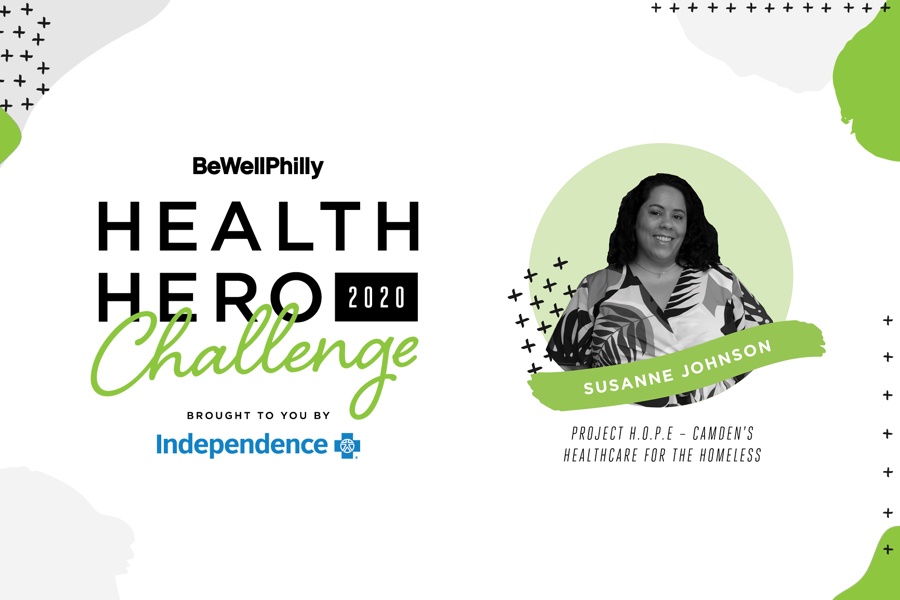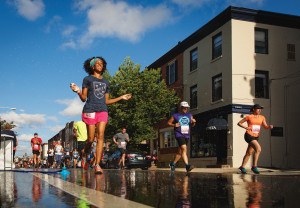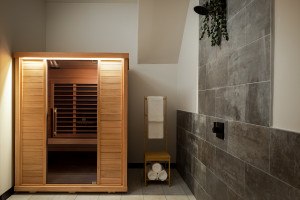This Nurse Practitioner Wants to Make Healthcare More Equitable
Meet Susanne Johnson, one of our 2020 Health Hero semi-finalists.

Susanne Johnson is one of our 2020 Health Hero semi-finalists. | Photos provided, design by Meredith Getzfread.
Over the next few weeks, we’ll be chatting with our semi-finalists in the 2020 Be Well Philly Health Hero Challenge brought to you by Independence Blue Cross to give you a glimpse of the people who are helping Philadelphians live healthier lives. Vote to help decide which of these 10 semi-finalists become one of three finalists — and get a sizable donation to a charity of their choice — here. Remember, you can vote once a day until October 1st!
Name: Susanne Johnson, (@seesuzgo), a family nurse practitioner.
Nonprofit of choice: Project H.O.P. E – Camden’s Healthcare for the Homeless. Their mission is to improve the health and well being of homeless persons and others in need by providing primary, preventative, and related health services. For the past thirteen years Project H.O.P.E. has fulfilled its mission by assisting more than 11,000 homeless persons in their journey to permanent housing and self-sufficiency.
***
What motivates you to try and make Philadelphia a healthier place?
Healthcare is a social justice issue. All persons deserve the right to access high quality, comprehensive primary care and preventive screenings. We live in a society that continues to place a premium on healthcare. Our current system of managed care organizations is set up to serve a privileged few. Philadelphia is one of the poorest large cities in the United States with 22% of Philadelphians self-reporting their health as poor or fair, according to the 2019 Health of the City report. 25% of Black residents and 32% of Hispanic residents report their health as poor or fair while only 20% of white residents report their health as such. In 2019, 1,556 per 1,000 Philadelphians had a potentially preventable hospitalization with non-Hispanic Black and Hispanic residents being disproportionately affected. This means that comprehensive, high quality health care remains largely inaccessible to most Philadelphians. Even with insured via programs like Medicaid and Medicare, Black and Hispanic residents are far more likely than their white counterparts to utilize emergency rooms and urgent cares for chronic conditions because of overcrowded public health centers with long wait times, lack of continuity of care, and lack of funds for daily medication.
Experts will try to use racialized medicine, the prevalence of substance use, or their concerns about “obesity” to explain why BIPOC individuals have poorer health and higher rates of chronic illness. If the encampments at 22nd and Ben Franklin Parkway [and on Ridge Ave.] are any indication, Philadelphia continues to overlook key social determinants of health that keep its residents mired in illness and stuck in the ever-revolving door of local emergency rooms. Chronic poverty, sustained lack of access to safe and stable housing, lack of consistent food resources, lack of access to quality education and safe schools, the school-to-prison pipeline, neighborhoods plagued by violence and police brutality, and childhood trauma – these all contribute to a person’s health, or ability to engage in health-promoting behaviors. The question is not “What should Philadelphians be doing to be healthier people?” but rather, “How can our city provide better access to health-promoting behaviors so that its residents feel empowered to manage their health and wellness?”
Chronic poverty, sustained lack of access to safe and stable housing, lack of consistent food resources, lack of access to quality education and safe schools, the school-to-prison pipeline, neighborhoods plagued by violence and police brutality, and childhood trauma – these all contribute to a person’s health, or ability to engage in health-promoting behaviors.
Describe a health or fitness related turning point in your life.
My entire life from the age of ten or 11 had been dedicated to the pursuit of weight loss and a thin body. I cycled through weight loss programs, both medical and commercial, daily stimulant medications, and underwent a bariatric surgery procedure that later resulted in complications and bulimia. I found great safety and comfort and validation in this pursuit – the daily weigh ins, the calorie or point counting, the red light and green light foods, the exercising until I was sick, the “No thank you’s” to food at parties. I was fat, but I was doing everything society told me I was supposed to be doing to not be fat and so that made me a worthy human being. It was the only thing that made the misery of such a stunted existence worthwhile.
I stopped dieting in 2018. I ended an emotionally and verbally abusive relationship, and realized that no form of exercise or plant-based food plan was going to make me worthy of love and affection if someone did not want to freely offer it to me. It was terrifying. I started seeing a therapist every week. I started weight lifting and training with barbells and discovered a diverse community of supportive and like-minded individuals. And, in turn, I began to value the body that I have. I am still fat, but there is joy now instead of misery. Joy and genuine love for myself have made me a better nurse practitioner. I no longer project my own perceived flaws and shortcomings onto my patients. The size of my body is not a direct reflection of how I care for myself and the size of my patient’s bodies are not reflections of my ability to provide competent care.
Joy and genuine love for myself have made me a better nurse practitioner. I no longer project my own perceived flaws and shortcomings onto my patients. The size of my body is not a direct reflection of how I care for myself and the size of my patient’s bodies are not reflections of my ability to provide competent care.
What policy would you institute to make Greater Philadelphia a healthier region?
Any policy I would consider instituting would focus on making health-promoting behaviors more accessible to residents. Currently, society puts too much onus on the individual to be “healthy” without providing individuals access to tools that would allow them to achieve greater health and wellness. I would look to create policies that would force our city government to take more responsibility for the health and wellness of its residents. I would look to provide safer environments for our residents so that a greater portion of individuals could access outdoor spaces for recreation. This would also include the development of increased green space, the judicious allocation of building permits to entities focused on providing mixed-use spaces, addressing public housing units that do not provide safe living environments and providing more effective pathways to permanent housing, and more robust programs to support regular access to food through mutual aid and community partnerships like Bunny Hop. Health starts with access to the most basic of necessities – without the assurance of safety in our neighborhoods, access to satisfying foods, a permanent home, access to areas for recreation or physical fitness, and access to mental health care, we will always be fighting a losing battle against chronic illness.
What’s the most important part of your health or wellness regimen?
It’s a combination of four things: time spent with dear friends, weekly therapy, quiet time alone, and a good night’s sleep. Spending time with friends who affirm my values, who provide support, who reflect the best parts of me provide such vital energy, make me feel invigorated, and keep me going through times of uncertainty. Access to weekly therapy helps me to address the behaviors and thought patterns (especially the negative ones) that I want to explore so that I can be a better human and healthcare provider. Therapy helped me learn to set boundaries and to advocate for myself. Quiet time alone, whether it be time engaging in joyful physical movement like a hike, knitting on my couch, reading a good book, or cooking a satisfying meal, provides vital time for my usually extroverted self to reset and recharge after expending a lot of social energy. Getting to bed before 10 p.m. and getting up at about the same time each morning helps me to feel refreshed and ready to conquer my to-do list. Eight hours of sleep helps me to better retain information I’ve learned during the day and decreases my anxiety. I know I can face my busy days more confidently if I am well rested.
What is your number one piece of health-related advice?
Find a primary care provider — someone with whom you think you can build a relationship. Someone who can help you manage all aspects of your care by providing specialty referrals if necessary, coordinating yearly preventive services, and more. Require them to earn your trust. Interview potential health care providers by drafting a list of questions to ask staff before you schedule an appointment. We work for you and you should never feel that you must subject yourself to a provider who does not honor and respect you and your goals and who does not meet your needs. Ask if the treatment plans your provider is recommended are evidence-based. Fire any providers who provide biased care that does not appear to be evidence-based.
Check out all the semi-finalists, and remember to vote HERE now. (Remember, you can vote once a day until October 1st!) Stay in touch with @bewellphilly and @phillymagevents and be sure to follow the challenge using #BWPHealthHero!


